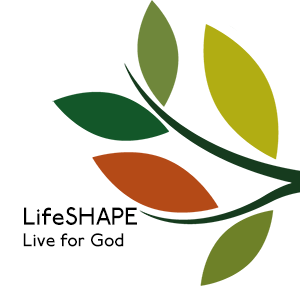
Do you remember the Dot-to-Dot puzzle books in which the hidden picture on the page gradually became visible as you painstakingly joined up the numbered dots? In the days before silicon chips, that was what passed as fun.
Try explaining that to a teenager.
Anyway: let me join up some dots, as we think about the LifeSHAPE of ‘contentment’.
In 2014 a team of American academics were researching how people in different cultures experience emotions. They wanted to find out what the similarities and differences were and what different people groups could learn from one another. They went to a remote tribal settlement in the Himalayas and found that the people there, whose lives had not been exposed to global cultures, nevertheless identified with a wide range of emotions. Sadness, embarrassment, joy, shame – all seemed to transcend culture. However, one emotion seemed to cause the most excitement.
Contentment.
The villagers drew breath and explained that “in our culture, this emotion is very special. It is the highest achievement of human well-being, and it is what the greatest enlightened masters have been writing about for thousands for years.”
Asked for more details they admitted that “It’s hard to translate it exactly, but the closest word in our language is chokkshay, which is a very deep and spiritual word that means ‘the knowledge of enough.’ It basically means that right here, right now, everything is perfect as it is, regardless of what you are experiencing outside.”
There are some rich Biblical connections to be made here.
Contentment: a spiritual gift, that right here, right now, even if everything is NOT perfect as it is, and regardless of what I am experiencing outside, I’m OK.
Think Paul and Silas praising God in prison (Acts 16:25).
Think Stephen’s peace while being stoned to death (Acts 7:55).
Think Habakuk’s fruitless vine and empty cattle stalls (Habbakuk 3:17-19).
They all seemed to believe that right here, right now, even though everything was NOT perfect they could still experience contentment, peace and even joy.
How do we get to this point of radical contentment?
Well, the research above explored a wide range of global wisdom, historic and contemporary, and concluded that there were two main ways that people sought contentment. One they called ‘The More Strategy’, the other ‘The Enough Strategy’.
The More Strategy seeks contentment by getting more. More stuff. More free time. More likes on faceBook. More friends. More attention.
More. When I’ve got it I will be content.
But it’s a flawed strategy because ‘More’ is insatiable. When you’ve got more, guess what? You want more!
The Enough Strategy holds out greater hope – but be warned that even the ‘Enough Strategy’ can morph into the More Strategy in disguise! If I feel I need enough friends, or enough money or enough affirmation, that can be just a different way of saying I need more of those things!
So what DO I need enough of, to be content.
Time to join some LifeWORKS dots.
What DO I need enough of, to be content? The answer is, ‘enough trust that God is good, and faithful and merciful and generous and on my case’.
If we don’t join the LifeSHAPE dot of Contentment, to the LifeSHAPE dot of Trust to the LifeSOURCE dots of God’s character the picture will be incomplete.
Contentment is not found in seeking contentment but in trusting God.
Contentment is not found in seeking contentment but in trusting God.
As Psalm 62:5-7 puts it:
Yes, my soul, find rest in God;
my hope comes from him.
Truly he is my rock and my salvation;
he is my fortress, I shall not be shaken.
My salvation and my honour depend on God;
he is my mighty rock, my refuge.
Contentment. The ability to be at ease within myself, whatever the circumstances BECAUSE my soul is resting in God.
Life is complicated. Stuff happens. We get sick. We get scammed. We make stupid decisions which end up hurting us or others that we care about. Our jobs are threatened. We can’t sleep… There is no end to the list of things that can make us DIScontent. We may need to work at some of those things – or even fight against them (no one is saying that we should be content with violence or injustice for example).
But it’s not about perfection, or adequacy or competence or ‘more’. It’s about holding on to the belief that God is enough. Only from that starting place can we enjoy the picture of Christian contentment.





